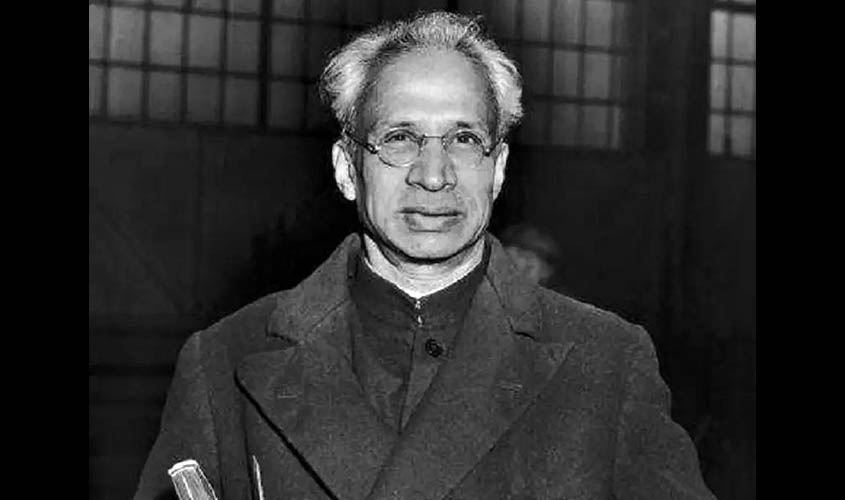Radhakrishnan patted Chairman Mao on his left cheek.
Among the very best biographies written in 20th century was S. Gopal’s of his father, Sarvepalli Radhakrishnan. Like his father, Gopal wrote great English. In the last paragraph of the first page he gives the reader a forthright glimpse of the father-son bond. He wrote: “This is a son’s book. The relation between my father and me were closer and more continuous than is usual, in this age, between parents and children and they brought with it, at times, obscure pain on both sides. Such close association enables me to be witness to a great deal in the later years that has been recounted here. But I have tried not to be swayed by personal affection and have shirked nothing.”
About Sarvepalli Radhakrishnan’s date of birth there has been confusion. The official version is that he was born on September 5, 1688, the second son of Brahmin parents, Sarvepalli Veeraswami and Sitamma. Radhakrishnan himself thought that he came into the world on September 20, 1887. I can think of no son of Indian writing that there is “the doubt whether Veeraswami was his father…credence is lent to the story by the difficulty in believing that Radhakrishnan and his four brothers and sister belonged to the same genetic pool, both suggested that Radhakrishnan belonged to different stock.”
Dr Radhakrishnan, himself was exceptionally reticent about his private life. In Fragments of a Confession, there is a short paragraph in which he writes, “In the present account it is not my intention to speak of my personal life, my parents and ancestry, my marriage and family, my likes and dislikes, my struggles and disappointments. No particular good fortune has lifted me above the sphere in which our common humanity struggles along, and I have had my own share of the burdens and anxieties of life. Although these are of immense importance to me, discretion forbids me to speak of them. Besides, they are of no particular interest to the philosophical public, who may wish to know my ideas and the process of thought which led up to them.”
When I joined IFS in 1953, S. Gopal, Dr Radhakrishnan’s son, was director of the Historical Division of the Ministry. As a part of their training, probationers were required to spend a week in various divisions of the Ministry including Historical Division. Gopal welcomed me in a non-bureaucratic manner. He asked about my family, my academic record. Being an Oxford man, he humorously pulled my leg for going to the “other place”, Cambridge. When I told him that I had got to know E.M. Forster well at Cambridge, Gopal enquired what I thought of A Passage to India. I do not recollect my answer but Gopal’s attitude became even more benign.
Before leaving for Peking—my first post—I asked Gopal, “What books should I read on China?” His answer was that few books on China were available in Delhi. “See if you can find Edgar Snow’s Red Star Over China.” No bookshop in Delhi had the book. On my way to Peking in July 1956, I bought a copy in Hong Kong.
One of the highs of my stay in China was Vice President Dr Radhakrishnan’s visit to China in September 1957. Gopal accompanied his father.
Chairman Mao Tse Tung received him in the courtyard of his house, which was situated in Chungnanhai, the most exclusive part of Peking and the most well guarded. The members of the Political Bureau lived there. No one else.
After shaking hands with Chairman Mao, Radhakrishnan did the unthinkable. He patted on his left cheek. The Chairman was taken aback—no one had ever taken such a liberty with the great helmsman—as well as everyone present, including Prime Minister Chou En Lai. The Indian side was actually embarrassed. I was one of them. But without batting an eyelid, the Vice President of India said, “Mr Chairman, don’t be alarmed, I did the same thing to Stalin and the Pope.” Tensions melted away to everyone’s relief.
Broadly speaking, philosophers are reputed to be lacking in humour. Radhakrishnan was an exceptionally witty man. The King of Greece came to India on a state visit. President Radhakrishnan (he had succeeded Dr Rajendra Prasad) welcomed him at Palam airport. “Your Majesty. You are the first King of Greece to come to India on invitation. Alexander the Great came uninvited.”
During the war against China in 1962, US Ambassador Kenneth Galbraith asked the President whether Lt General B.M. Kaul had been taken prisoner by the Chinese. The answer was: “It is unfortunately untrue.” General Kaul’s performance during the Sino-India conflict was an unmitigated disaster.
In June 1961, I had an appendicitis operation in the Safdarjung Hospital. Gopal somehow got to know. On the second day I heard a lot of commotion in the corridor leading to my room. The door of my room was suddenly opened. Who had opened it, the doctor who had operated on me. In walked the President of India, followed by S. Gopal, “What have you done to yourself, Natwar Singh? Get well soon.” I was then a 31-year-old Under Secretary.

